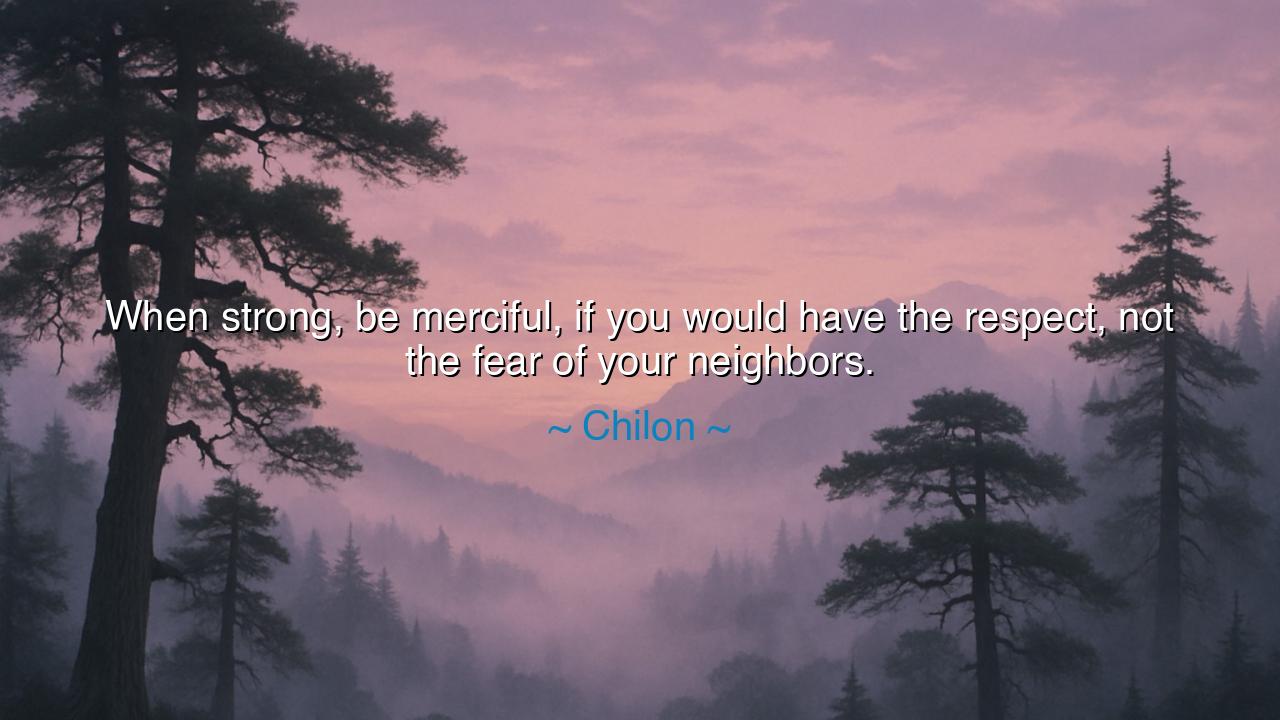
When strong, be merciful, if you would have the respect, not the
When strong, be merciful, if you would have the respect, not the fear of your neighbors.






"When strong, be merciful, if you would have the respect, not the fear of your neighbors." — these are the words of Chilon, one of the Seven Sages of Greece, spoken not to glorify power, but to temper it. For strength without mercy is like a sword with no sheath — sharp, proud, and short-lived. Chilon, who lived in the ancient city of Sparta, understood well the dual nature of might: that to rule justly, one must balance courage with compassion. His wisdom was born from the storms of human ambition, from the sight of warriors who won battles but lost their humanity, and rulers who commanded obedience but not love.
To be strong is not merely to conquer others, but to master oneself. Power is a test of character — when the weak rise to strength, the gods look upon how they wield it. The cruel man sees his enemies as prey; the wise man sees them as mirrors of his own frailty. Mercy is not weakness; it is the nobility of restraint. It is the mark of one who has learned that victory gained through blood and terror brings silence, but never harmony. Chilon’s teaching reminds us that respect grows from fairness, while fear breeds rebellion in silence.
Consider the story of Alexander the Great, whose sword stretched from Greece to India. In his youth, his might was fire, unbridled and glorious. But there came a moment that tested his soul — when he captured the Persian King Darius’s family after a great battle. Instead of cruelty, Alexander showed mercy. He treated them with dignity and honor, refusing to harm those who had once lived in splendor. His men marveled, and even his enemies spoke his name with respect. In that moment, he proved that greatness is not only in conquering lands, but in conquering one’s rage.
Contrast this with tyrants, whose names history spits out with bitterness. They rule through fear, their strength hollow and fleeting. The people obey, but with hearts closed and eyes watching for the first chance to strike back. The empire of Nero, built on terror, burned with him; the realm of Marcus Aurelius, guided by wisdom and mercy, lived on in memory and reverence. For fear binds the body, but respect binds the soul. It endures even when the ruler is gone.
In every age, the strong are tested not by the power they wield, but by what they choose to do with it. The general who spares his foe, the ruler who forgives a rebel, the parent who corrects with love — these are the true victors in the eyes of time. Mercy is the proof of strength; it is the fragrance that remains after the storm. For when a mighty hand lifts instead of strikes, it teaches more than a thousand decrees could ever command.
So, my children, when strong, be merciful. Let your power serve justice, not pride. Let your words carry peace, not arrogance. If you wish your neighbors to respect you, show them the humanity that lies beneath your strength. They may fear your sword, but they will revere your hand if it brings healing.
The lesson is clear and timeless: Strength without mercy breeds ruin; strength with mercy builds legacy. Be the kind of person others follow not because they must, but because they choose to. When you stand in a place of power — whether over one heart or a hundred souls — remember Chilon’s wisdom. Temper your might with compassion, and you shall walk among the strong in peace, not in loneliness.






AAdministratorAdministrator
Welcome, honored guests. Please leave a comment, we will respond soon